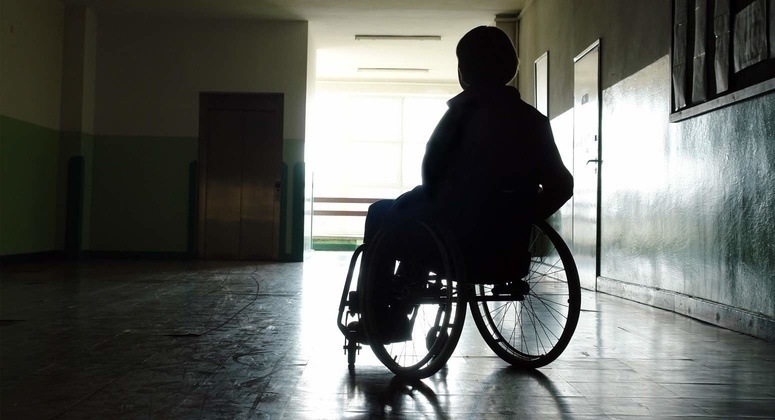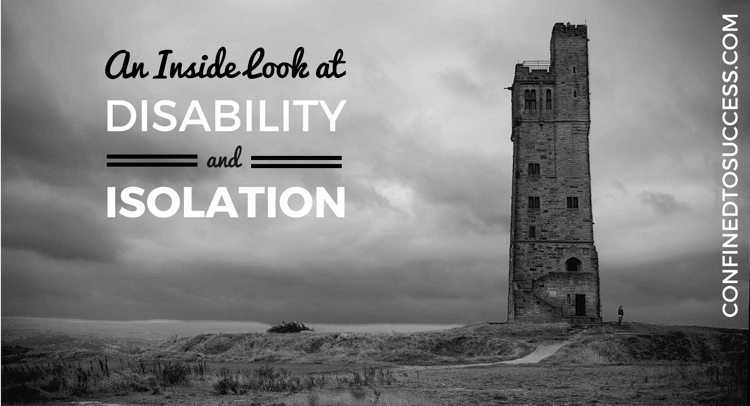Disability And Isolation (An Inside Look)

If you’ve been disabled for awhile, you’ve probably experienced isolation at some point or maybe even all the time. Unfortunately, the combination of a disability and isolation is all too common, affecting thousands, if not millions of disabled people.
So how big of a problem is isolation for you or your disabled loved one? And why does one usually go with the other? I’ll talk about both in this blog post. Plus, you’ll learn about the harmful effects isolation has on the body and some suggestions on how to reconnect with people and foster better health.
WHY DO DISABLED PEOPLE FEEL ISOLATED?
It’s normal to feel isolated from time to time as it’s part of being human. But the sad fact is many disabled people experience isolation nearly always for several reasons…
1. Prevented from Going Out
This first reason probably accounts for most feelings of isolation among the disabled — while the desire to go out is there, the limitations are too great…
- Being homebound – A disability that keeps you homebound and thus detached from the outside world can make you feel isolated.
- Feeling unwell – Symptoms stemming from a disability or medications can keep you stuck at home.
- Logistically difficult – Limited transportation options and lack of accessibility laws can make a simple trip like visiting a friend’s house challenging.
- Financial constraints – Participating in events is often rare due to tight budgets.
2. Abandonment Issues
Facing a disability is challenging to all parties involved — family, friends, and, of course, the person who’s disabled. Unfortunately, the longer you stay disabled, the greater the chance some friends and possibly even family members will disappear from your life.
For many disabilities – especially “invisible illnesses” – people expect recovery after a while and when that time comes and goes without improvement, they gradually give up on you.
Then there are those who feel uncomfortable around you from the outset — they don’t know how to behave, much less console you. So it’s easier for them to walk out of your life than learn how to feel at ease.
Life can become small when you have a disability and when you factor in abandonment, it practically becomes microscopic!
3. Feeling “Different” from Everyone Else
From the time we’re in grade school, we work to “fit” into groups we want to be a part of. Now as disabled people, we find ourselves part of a group we never wanted to be in in the first place!
Suddenly, you’re different and many non-disabled people have trouble dealing with that, partly because they don’t know what, if any, etiquette there is when behaving around you.
In our age of microaggressions, it’s easier to avoid human interaction than run the risk of causing offense, which only deepens the sense of isolation. [source]
4. Byproduct of American Society
As stated in the national bestselling sociology book, Bowling Alone, in recent decades American society has become “more disconnected from families, neighbors, communities, and the republic itself,” both in urban and rural areas.
(This is something I personally attest to, especially after having lived in other countries in a former life).
Now, add the disabled segment of the American population to the mix and the stats must be off the charts!
HOW TO IDENTIFY WHETHER A DISABLED PERSON FEELS ISOLATED?
Many people are good at hiding their feelings, including the disabled. That’s why it’s sometimes hard to tell the extent to which isolation affects them. Still, there are a few general signs to watch out for, which may be factors…
- Submissive body language – A defeated demeanor, tightly crossed arms and legs and staring off into space.
- Longing for human touch – Holding another person’s hands or arms longer than usual.
- Wearing drab clothing – Colorless, monotone clothes worn day in and day out.
- Substance abuse – Excessive alcohol consumption and/or recreational drugs.
THE TOLL ISOLATION TAKES ON THE BODY
Human beings are by nature social animals and studies now show that regular social activity and engagement does wonders for our health.[source] But the opposite is also true — a deep sense of isolation can affect the body adversely over time…
- Deteriorates physical health – Weakens immune system, impairs sleep, contributes to heart disease and premature death.
- Erodes self-confidence – Development of social anxiety over a prolonged period of non-interaction with other people.
- Produces mental problems – Greater risk for dementia and psychosomatic illnesses.
It’s not a rosy picture, is it? But it doesn’t have to be this way. Even if you’re disabled, there are both short and long-term solutions available to help you feel less isolated…
13 WAYS TO HELP RE-ENGAGE WITH THE WORLD
1. Get Involved in Your Local Church, Synagogue or Mosque
This is probably the best way to combat social isolationism and studies now show that religious people who actively take part in their community are happier. [source]
2. Chat with Your Therapist Online
Skype and Facetime make online chatting super easy nowadays.
3. Stay in Touch with Friends via Social Media
Social media can be a double-edged sword. On one hand, it gives you the chance to connect with friends whom you might not otherwise be in contact with. But it also might make you feel jealous and miserable seeing your friends’ status updates and all the things you’re missing out on. Ultimately, only you can decide whether it’s a good option.
4. Become an Active Member In Support Groups
Offline and online support groups are a great way to bond with other people who have the same disability as you. When you become active in the community, you’ll get the support you need and even make life-long friends!
5. Get a Cat or Dog
Having a constant pet companion by your side benefits your health, as it both lowers stress and the risk of heart disease. And if you get a dog and are able to walk him/her yourself, you’ll have an easier time meeting people! [source]
6. Take Up a New Hobby
What about baking? Origami? Painting? The point is, try something new and connect with people in hobby-specific forums online.
7. Watch TV or a Movie
Well, not any TV show or movie but mostly programs that inspire, uplift, or humor you. You can then connect with people in online forums and places like Reddit and Facebook to engage in discussion.
8. Listen to Music
Music is great at distracting you from life’s ills. It has the power to take you out of yourself which is sometimes all you need to make a difference.
9. Read an Uplifting (or Depressing!) Book
Reading uplifting books is a no-brainer because they help you feel better about yourself and the world at large. But perhaps more surprisingly, reading true stories about people who’ve suffered horribly may help too because they remind you that you’re not alone.
10. Try Meditation
It’s difficult to get a clear perspective on your life when you’re constantly wrapped up in your thoughts. Meditation helps cut through the incessant thinking and replaces it with a peaceful glimpse of the real “you,” free from emotional baggage and negative beliefs.
11. Treat Yourself to a Massage
Massage is a great way to relax and feel at ease with yourself and the world.
12. Travel Somewhere
Getting out of your familiar surroundings is rejuvenating and gives you a renewed appreciation for life. So unless you’re physically unable, take a trip for the day or better yet, travel overseas to a disability-friendly city or country! [source]
13. Start a Blog
Would you believe that of the past 12 suggestions, 4 of them also apply to blogging? Let’s see how…
- Blogging makes a great hobby and keeps you busy
- Blogging is possible from anywhere, making traveling uncomplicated
- Blogging while listening to music go hand in hand
- Blogging makes it easy to make new friends through a blog’s comments section and social media presence
For these reasons and more, blogging is one of the best ways to re-engage with the world, especially when you’re homebound.
But here’s another great thing I love about blogging…it offers you the chance to earn a side income to your disability benefits which is SO important since most disabled people are in bad shape financially.
NOW IT’S YOUR TURN!
Are you disabled and experience isolation? How has it affected you? Leave your comments below!








